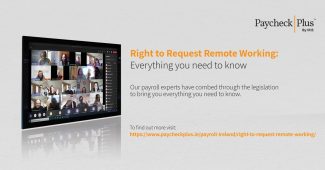
Remote Working Relief: Separating Fact From Fiction
All over Ireland, companies large and small are switching part or all of their operations to a remote work model. This move has significant payroll and tax implications both for employers and employees. In this article our payroll service team examine the qualification criteria, entitlements and wider payroll implications of remote working, but before we do so it is crucial to understand what constitutes remote working.
What counts as Remote Working?
According to the Revenue Commissioners, Remote Working refers to the remote development of products, services, or ideas, as well as the carrying out of work-related activities from an employee’s home. Remote working activities include sending and receiving emails, and handling files and / or data.
According to the official definition, the concept of remote working applies irrespective of whether activities are done on a full or part-time basis. The concept applies as long as work is conducted from the employee’s home, whether partially or entirely. This means that employees who now work mostly from home (but who also occasionally work from their employer’s workplace) are considered eWorkers too.
Some important things to know about Remote Working relief
It is important to understand the basic requirements that allow employees to avail of Remote Working relief.
Who can and who can’t apply
Remote working allowances are available to employees who conduct work-related activities from their homes either on a full time or on a part-time basis. However, employees who work from their usual place of employment and take work home outside of their normal working hours do not qualify. According to Revenue guidelines the conditions for the allowance are met when:
- There is a formal agreement in place between the employer and the employee under which the employee is required to work from home
- An employee is required to perform substantive duties of the employment at home
- An employee is required to work for substantial periods at home
What the allowance covers
The Remote Working Relief is designed to offer support covering heating, electricity, and broadband expenses incurred as a consequence of work-related activities conducted from the employee’s home.
Under the guidelines published by the Revenue Commissioners, some remote workers qualify for Remote Working Relief. Moreover, Irish employers may offer an allowance of €3.20 per day to any employees required to switch to remote working without needing to deduct PAYE, PRSI or USC. These considerations apply whether payroll service is carried out in house or via an outsourced payroll service. Amounts in excess of €3.20 paid by the employer should be subjected to tax. Records of payments made must be retained by the employer for the purpose of any potential future Revenue compliance intervention.
Remote work allowances and payroll service
Since the measures introduced are relatively new, it is important to have a clear overview of their tax and payroll implications.
Recording and accounting for Eworking allowances
There may be some misconceptions surrounding the new remote work guidelines. First of all, PAYE, USC, or PRSI cannot be deducted from the allowance amount. This needs to be taken into account by your payroll service, or in the case of externally managed payroll by the company to which you have outsourced payroll.
Secondly, if the expenses incurred by a remote worker are greater than €3.20 per day, employers may choose to cover them – or not. If you choose to cover these expenses, you must keep proof of payment. If you choose not to cover such expenses, employees can still claim them at the end of the year by submitting them to their designated revenue office through “MyEnquiries” online service.
Impact of remote work allowance and relief on other taxes
Under the remote work scheme, employers may choose to provide specific equipment and facilities to their employees exclusively for business use. These include:
- A desktop computer or laptop
- The necessary software to work remotely
- A printer and / or a scanner
- Telecommunications equipment, such as a fixed or mobile telephone and broadband connection
- Office Furniture
However, it is important to note that these provisions do not amount to a benefit-in-kind. This means that employers cannot impose any benefit-in-kind charges to employees who are required to work from home.
In addition, the use of an employee’s home for work purposes will not affect Capital Gains Tax. Similarly, it does not entail a reduction on Local Property Tax.
If your payroll service works in house, it is crucial to ensure it is able to process these deductions and are familiar with the tax implications of these new measures. However, given the time-consuming nature of this task, many employers elect to have a managed payroll service undertake these tasks as part of an outsourced payroll service. Paycheck Plus operate such a service. We have an expert team of payroll processors who can manage remote work-related claims so you can concentrate on steering your business through this difficult time.
Paycheck Plus, Your Outsourced Payroll Provider
Paycheck Plus is an award-winning outsourced payroll provider, serving national and international businesses with industry-leading accuracy levels, strict levels of confidentiality and top-rated payroll processes. We provide comprehensive, ISO and ISAE 3402 accredited, payroll outsourcing services to organisations of all sizes.
Our highly experienced payroll processing experts can help you to navigate all aspects of local taxation and help you meet your legal requirements. Our services include international payroll processing, payroll consultancy, payroll audits, payroll reporting, payroll training, and much more.
To ensure payroll accuracy or for more information simply request a quote or call our Irish payroll company on +353 (0) 1 905 9400


